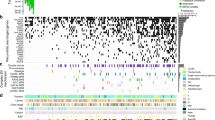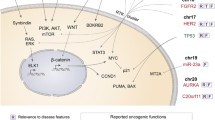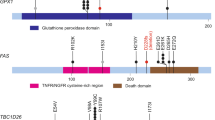Abstract
Structural and numeric centrosome aberrations can induce chromosome segregation errors and promote tumor development and progression. We systematically evaluated associations of 19,603 single nucleotide polymorphisms (SNPs) across 136 centrosome-related genes with gastric cancer (GC) risk using four GWAS datasets with a total of 3771 cases and 5426 controls. We identified two loci at 15p13.3 and 7q11.23 significantly associated with GC risk, whose risk alleles were correlated with increased mRNA expression of CEP72 (P = 7.30 × 10–4) and YWHAG (P = 1.60 × 10–3), respectively. Dual-luciferase reporter assays confirmed that the risk T allele of rs924607 at 15p13.3 significantly increased a promoter activity of the reporter gene, leading to a higher CEP72 expression level. At 7q11.23, the risk haplotype of rs2961037 [G]-rs2961038 [G] significantly elevated an enhancer activity and the expression of YWHAG. Both the mRNA and protein levels of CEP72 and YWHAG were overexpressed in GC tumor tissues compared with peritumor tissues and overexpression of either gene showed an unfavorable prognosis of GC patients. Moreover, knockdown of either CEP72 or YWHAG inhibited GC cell proliferation, migration and invasion and promoted GC cell apoptosis. The genes coexpressed with CEP72 or YWHAG in GC tumor tissues were enriched in the Ras signaling pathway, which was confirmed that knockdown of either one decreased the expression of cyclin D1 but increased the expression of p21 and p27. In conclusion, genetic variants at 15p13.3 and 7q11.23 may confer GC risk via modulating the biological functions of CEP72 and YWHAG, respectively, suggesting the importance of centrosome-regulated genes in GC development.




Similar content being viewed by others
Abbreviations
- GWAS:
-
Genome-wide association studies
- SNP:
-
Single nucleotide polymorphism
- MSigDB:
-
The Molecular Signatures Database
- eQTL:
-
Expression quantitative trait locus
- MAF:
-
Minor allele frequencies
- HWE:
-
Hardy–Weinberg equilibrium
- LD:
-
Linkage disequilibrium
- FDR:
-
False discovery rate
- GTEx:
-
The Genotype-Tissue Expression project
- DHS:
-
DNase I hypersensitivity sites
- TFBS:
-
Transcription factor binding sites
- ENCODE:
-
The Encyclopedia of DNA Elements
- KEGG:
-
Kyoto Encyclopedia of Genes and Genomes
References
Abnet CC, Freedman ND, Hu N et al (2010) A shared susceptibility locus in PLCE1 at 10q23 for gastric adenocarcinoma and esophageal squamous cell carcinoma. Nat Genet 42(9):764–767. https://doi.org/10.1038/ng.649
Bai Q, Yu J, Li Y, Ma J, Gou Y (2018) MicroRNA-182 promoted esophageal squamous cell carcinoma cell growth and metastasis via targeting YWHAG. J BUON 23(5):1439–1447
Boyle AP, Hong EL, Hariharan M et al (2012) Annotation of functional variation in personal genomes using RegulomeDB. Genome Res 22(9):1790–1797. https://doi.org/10.1101/gr.137323.112
Bray F, Ferlay J, Soerjomataram I, Siegel RL, Torre LA, Jemal A (2018) Global cancer statistics 2018: GLOBOCAN estimates of incidence and mortality worldwide for 36 cancers in 185 countries. CA Cancer J Clinic 68(6):394–424. https://doi.org/10.3322/caac.21492
Carithers LJ, Moore HM (2015) The Genotype-Tissue Expression (GTEx) project. Biopreserv Biobank 13(5):307–308. https://doi.org/10.1089/bio.2015.29031.hmm
Chen W, Zheng R, Baade PD et al (2016) Cancer statistics in China,2015. CA Cancer J Clinic 66(2):115–132. https://doi.org/10.3322/caac.21338
Davis CA, Hitz BC, Sloan CA et al (2018) The Encyclopedia of DNA elements (ENCODE): data portal update. Nucleic Acids Res 46(D1):D794–D801. https://doi.org/10.1093/nar/gkx1081
Diouf B, Crews KR, Lew G et al (2015) Association of an inherited genetic variant with vincristine-related peripheral neuropathy in children with acute lymphoblastic leukemia. JAMA 313(8):815–823. https://doi.org/10.1001/jama.2015.0894
Fan G, Sun L, Shan P et al (2015) Loss of KLF14 triggers centrosome amplification and tumorigenesis. Nat Commun 6:8450. https://doi.org/10.1038/ncomms9450
Fukasawa K (2007) Oncogenes and tumour suppressors take on centrosomes. Nat Rev Cancer 7(12):911–924. https://doi.org/10.1038/nrc2249
Gharahkhani P, Fitzgerald RC, Vaughan TL et al (2016) Genome-wide association studies in oesophageal adenocarcinoma and Barrett's oesophagus: a large-scale meta-analysis. Lancet Oncol 17(10):1363–1373. https://doi.org/10.1016/S1470-2045(16)30240-6
Helgason H, Rafnar T, Olafsdottir HS et al (2015) Loss-of-function variants in ATM confer risk of gastric cancer. Nat Genet 47(8):906–910. https://doi.org/10.1038/ng.3342
Hou Z, Peng H, White DE et al (2010) 14-3-3 binding sites in the snail protein are essential for snail-mediated transcriptional repression and epithelial-mesenchymal differentiation. Can Res 70(11):4385–4393. https://doi.org/10.1158/0008-5472.CAN-10-0070
Hu N, Wang Z, Song X et al (2016) Genome-wide association study of gastric adenocarcinoma in Asia: a comparison of associations between cardia and non-cardia tumours. Gut 65(10):1611–1618. https://doi.org/10.1136/gutjnl-2015-309340
Huang CH, Chen CJ, Chen PN et al (2019) Impacts of AURKA genetic polymorphism on urothelial cell carcinoma development. J Cancer 10(6):1370–1374. https://doi.org/10.7150/jca.30014
Kundaje A, Meuleman W, Ernst J et al (2015) Integrative analysis of 111 reference human epigenomes. Nature 518(7539):317–330. https://doi.org/10.1038/nature14248
Li X, Song N, Liu L et al (2017) USP9X regulates centrosome duplication and promotes breast carcinogenesis. Nat Commun 8:14866. https://doi.org/10.1038/ncomms14866
Luddecke S, Ertych N, Stenzinger A et al (2016) The putative oncogene CEP72 inhibits the mitotic function of BRCA1 and induces chromosomal instability. Oncogene 35(18):2398–2406. https://doi.org/10.1038/onc.2015.290
Medema RH, Kops GJ, Bos JL, Burgering BM (2000) AFX-like Forkhead transcription factors mediate cell-cycle regulation by Ras and PKB through p27kip1. Nature 404(6779):782–787. https://doi.org/10.1038/35008115
Milam MR, Gu J, Yang H et al (2007) STK15 F31I polymorphism is associated with increased uterine cancer risk: a pilot study. Gynecol Oncol 107(1):71–74. https://doi.org/10.1016/j.ygyno.2007.05.025
Morrison DK (2009) The 14-3-3 proteins: integrators of diverse signaling cues that impact cell fate and cancer development. Trends Cell Biol 19(1):16–23. https://doi.org/10.1016/j.tcb.2008.10.003
Nigg EA, Holland AJ (2018) Once and only once: mechanisms of centriole duplication and their deregulation in disease. Nat Rev Mol Cell Biol 19(5):297–312. https://doi.org/10.1038/nrm.2017.127
Nigg EA, Stearns T (2011) The centrosome cycle: centriole biogenesis, duplication and inherent asymmetries. Nat Cell Biol 13(10):1154–1160. https://doi.org/10.1038/ncb2345
Olson JE, Wang X, Pankratz VS et al (2011) Centrosome-related genes, genetic variation, and risk of breast cancer. Breast Cancer Res Treat 125(1):221–228. https://doi.org/10.1007/s10549-010-0950-8
Ruan Y, Song AP, Wang H et al (2011) Genetic polymorphisms in AURKA and BRCA1 are associated with breast cancer susceptibility in a Chinese Han population. J Pathol 225(4):535–543. https://doi.org/10.1002/path.2902
Sakamoto H, Yoshimura K, Saeki N et al (2008) Genetic variation in PSCA is associated with susceptibility to diffuse-type gastric cancer. Nat Genet 40(6):730–740. https://doi.org/10.1038/ng.152
Shi Y, Hu Z, Wu C et al (2011) A genome-wide association study identifies new susceptibility loci for non-cardia gastric cancer at 3q13.31 and 5p13.1. Nat Genet 43(12):1215–1218. https://doi.org/10.1038/ng.978
Stock W, Diouf B, Crews KR et al (2017) An Inherited genetic variant in CEP72 promoter predisposes to vincristine-induced peripheral neuropathy in adults with acute lymphoblastic leukemia. Clin Pharmacol Ther 101(3):391–395. https://doi.org/10.1002/cpt.506
Tang W, Wu JQ, Guo Y et al (2008) Cdc2 and Mos regulate Emi2 stability to promote the meiosis I-meiosis II transition. Mol Biol Cell 19(8):3536–3543. https://doi.org/10.1091/mbc.E08-04-0417
Wang H, Zhi H, Ma D, Li T (2017a) MiR-217 promoted the proliferation and invasion of glioblastoma by repressing YWHAG. Cytokine 92:93–102. https://doi.org/10.1016/j.cyto.2016.12.013
Wang K, Li M, Hakonarson H (2010) ANNOVAR: functional annotation of genetic variants from high-throughput sequencing data. Nucleic Acids Res 38(16):e164. https://doi.org/10.1093/nar/gkq603
Wang P, Deng Y, Fu X (2017b) MiR-509-5p suppresses the proliferation, migration, and invasion of non-small cell lung cancer by targeting YWHAG. Biochem Biophys Res Commun 482(4):935–941. https://doi.org/10.1016/j.bbrc.2016.11.136
Wang Z, Dai J, Hu N et al (2017c) Identification of new susceptibility loci for gastric non-cardia adenocarcinoma: pooled results from two Chinese genome-wide association studies. Gut 66(4):581–587. https://doi.org/10.1136/gutjnl-2015-310612
Ward LD, Kellis M (2012) HaploReg: a resource for exploring chromatin states, conservation, and regulatory motif alterations within sets of genetically linked variants. Nucleic Acids Res 40(Database issue):D930–D934. https://doi.org/10.1093/nar/gkr917
Yan C, Zhu M, Ding Y et al (2019) Meta-analysis of genome-wide association studies and functional assays decipher susceptibility genes for gastric cancer in Chinese populations. Gut. https://doi.org/10.1136/gutjnl-2019-318760
Yun M, Rong J, Lin ZR et al (2015) High expression of transforming acidic coiled coil-containing protein 3 strongly correlates with aggressive characteristics and poor prognosis of gastric cancer. Oncol Rep 34(3):1397–1405. https://doi.org/10.3892/or.2015.4093
Zeng S, Tao Y, Huang J et al (2013) WD40 repeat-containing 62 overexpression as a novel indicator of poor prognosis for human gastric cancer. Eur J Cancer 49(17):3752–3762. https://doi.org/10.1016/j.ejca.2013.07.015
Zhao YL, Zhong SR, Zhang SH et al (2019) UBN2 promotes tumor progression via the Ras/MAPK pathway and predicts poor prognosis in colorectal cancer. Cancer Cell Int 19:126. https://doi.org/10.1186/s12935-019-0848-4
Zhu M, Yan C, Ren C et al (2017) Exome Array Analysis identifies variants in SPOCD1 and BTN3A2 that affect risk for gastric cancer. Gastroenterology 152(8):2011–2021. https://doi.org/10.1053/j.gastro.2017.02.017
Zhu YC, Zhou YF, Wang WX et al (2018) CEP72-ROS1: A novel ROS1 oncogenic fusion variant in lung adenocarcinoma identified by next-generation sequencing. Thoracic cancer 9(5):652–655. https://doi.org/10.1111/1759-7714.12617
Acknowledgements
This work was supported by grants from the National Natural Science Foundation of China (81872702); National Major Research and Development Program (2016YFC1302703); Key Research and Development Program of Jiangsu Province (BE2019698); Jiangsu Province "333" project (BRA2018057). Project funded by China Postdoctoral Science Foundation (2019TQ0157). The authors thank all the participants of the Nanjing/Beijing and the U.S. National Cancer Institute gastric cancer studies.
Author information
Authors and Affiliations
Corresponding authors
Ethics declarations
Conflict of interest
The authors declare that they have no conflict of interest.
Additional information
Publisher's Note
Springer Nature remains neutral with regard to jurisdictional claims in published maps and institutional affiliations.
Electronic supplementary material
Below is the link to the electronic supplementary material.
Rights and permissions
About this article
Cite this article
Ni, J., Wang, J., Fu, Y. et al. Functional genetic variants in centrosome-related genes CEP72 and YWHAG confer susceptibility to gastric cancer. Arch Toxicol 94, 2861–2872 (2020). https://doi.org/10.1007/s00204-020-02782-7
Received:
Accepted:
Published:
Issue Date:
DOI: https://doi.org/10.1007/s00204-020-02782-7




